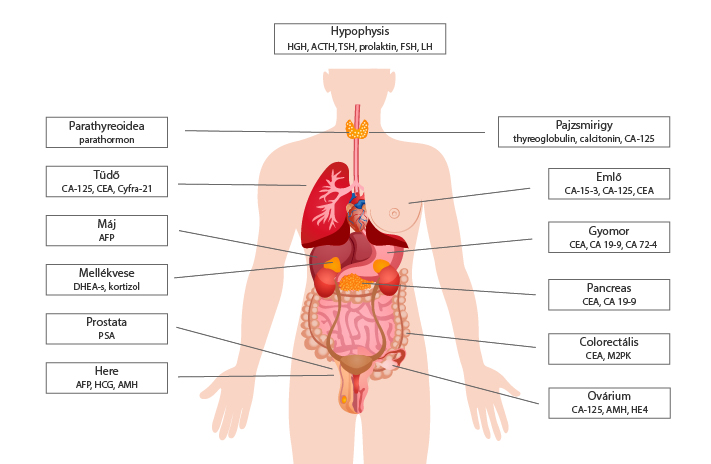Tumour markers
Why is laboratory testing important?
Laboratory tests can help identify or, where appropriate, rule out the underlying diseases.
However, it is important to highlight that the result of a laboratory test does not in itself constitute a diagnosis, only the results are included in the finding. You will receive the diagnosis, therapy or treatment recommendation from your specialist or treating physician who ordered the laboratory tests.
Contact your doctor with all laboratory test results.
Tumour types and their markers
| Tumour marker | Full name | Oncology field |
| AFP | Alfa-foetoprotein | Liver and egg cell tumours |
| CA 125 | Cancer antigen 125 | Ovary tumour |
| CA 19-9 | Cancer antigen 19-9 | Pancreatic tumour |
| CA 15-3 | Cancer antigen 15-3 | In case of breast cancer |
| CEA | Carcinoembryonic antigen | Digestive organ tumours |
| PSA | Prostate antigen | Prostate cancer |
| PSA free | Prostate-specific antigen | Prostate cancer |
| Septin 9 | Septin-9 | Colon cancer |
| S-100 | S-100 | Melanoma |
| Bone trap 5B | Bone trap 5B | Bone tumour, bone metastasis |
| Cyfra-21 | Cyfra-21 | Not small cell lung cancer |
| TPA | Tissue polipeptid antigene | Possible tumour marker: breast, lung, bladder and ovarian cancer |
Tumour markers
Tumour markers are produced by tumour cells. The laboratory can detect these substances from body secretions: blood, urine, cerebrospinal fluid, faeces. Tests make sense if there are any complaints or symptoms that raise the possibility of a tumour. If the tumour marker test is performed before the tumour therapy, the tracking of the parameter is suitable for monitoring the effectiveness of the therapy and for indicating the recurrence of the tumour.
A negative test result (the tumour marker concentration is in the normal range) does not necessarily indicate a tumour-free condition, as a positive result does not necessarily indicate cancer. In a positive case, further tests can be used to determine if there is indeed a cancerous lesion. Among other things, one of the most common types of cancer, colon cancer, can be screened for with laboratory testing of blood and stool samples.
Please note that the tests performed do not give a diagnosis, it is the responsibility of your doctor to evaluate the results and establish the diagnosis.

Available tests
AFP
Beta-2 microglobulin (B2M)
Bone trap 5B (bone tumor marker)
CA-125 (ovary tumor marker)
CA 15-3 (breast tumor marker)
CA 19-9 (pancreatic tumor marker)
CA 72-4
CEA (gastrointestinal tumor marker)
Chromogranin A (CgA)
Cyfra-21 (lungs tumor marker)
HE-4 (ROMA index)
Neuron-specific enolase (NSE)
PSA (prostate tumor marker)
PSA free
Septin 9 + panel – ColonAIQ (Colon tumor screening with molecular test)Septin 9 (colon tumor marker, temporarily unavailable)
S-100
Fecal M2-PK + Fecal Occult Blood Test (rectal tumor marker)
TPA (tissue polipeptid antigene, breast, lungs, bladder, ovary tumor marker)

